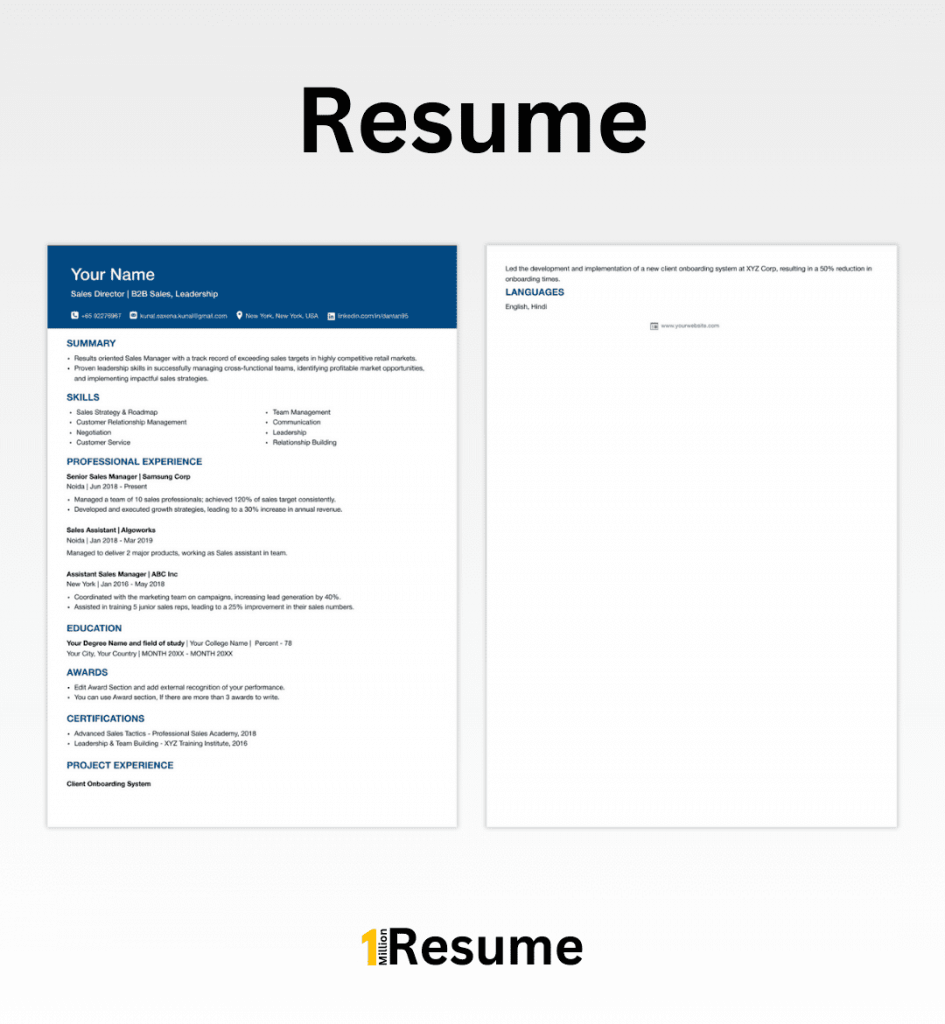Resume vs CV: Understand and Decide

In the professional world, the terms “resume” and “CV” are often used interchangeably, but they are not the same. Both are essential tools in job hunting, but they serve different purposes and are used in different contexts. This article aims to clarify the differences between a resume and a CV(curriculum vitae) and guide you on when to use each.
Resume and CV meaning can change based on your grography as well. In USA and Canada you will be using resume to apply jobs unless you are applying to academic or research position. While in Europe, Ireland and New Zealand CV and “resume” mean the same thing.
Whether you’re using a resume builder or a CV generator, it’s crucial to know which document is appropriate for your job application. Both documents are used to present your qualifications, but they differ in structure, content, and length. Let’s start with understanding resume first.
By end of this you”ll know
What is a Resume?
Resume is derived from the French word résumé, meaning “The Summary”. A resume is a concise document, typically one to two pages long that summarizes your professional experience, skills, and education. It’s tailored to the job you’re applying for, highlighting relevant experience and achievements. Resumes are commonly used in the United States and Canada.
Key Components of Resume
Key components of resume include –
- Contact Information: This has your name, email id, contact number and address so that recruiter can contact you back.
- Professional Summary or Objective: Your career highlights or career aspirations goes to the top of your resume.
- Work Experience: Your work experience tells potential employer your roles, responsibilities, achievements and duties performed under each job.
- Education: List your post graduate, graduate degrees and relevant qualifications under this section.
- Skills: This is most important section in your resume that will list your 10 key skills.
Experienced professionals will have Work Experience to write but Students / Freshers will not have experience. So if they want to add more information, they can add below sections –
- Certifications: Show your relevant certifications and online training cources to future employer.
- Relevant Projects: Projects acts as testament of your work and you have put your skills to use. Very useful for early career professionals.
- Extracurricular Activities: Students/Freshers can list their event organisation, co-ordination or similar experience under this section.

Purpose of Resume
Purpose of resume is to secure an interview by presenting your skills, experience and accomplishments. It is designed to be concise (within 2 pages) and reviewed quickly by recruiter and interviewer.
Employer rarely spend more than few minute on your resume and good resumes have right balance of content and white spacing, making it easy to scan. Resumes are tailored for job role before applying. That way to apply multiple types of roles, you will need multiple resume.
Types of Resume
Resume are of 3 types
- Chronological Resume
- Functional Resume
- Combinational Resume
You will be using chronological resume or combinational resume types to apply jobs.
Key Features of a Resume
- Brief and concise document
- Customized for the job
- Focuses on skills and achievements
- Used mainly in the U.S. and Canada
What is a CV?
CV is latin for Curriculam Vitae means course of life. A Curriculum Vitae (CV) is a more comprehensive document that details your entire career history. It’s usually three pages or long and is often used for academic, research, or international job applications.
Unlike a resume, a CV includes a complete list of your achievements, publications, research, and affiliations.
Key Components of a CV
The key components of a CV include:
- Contact Information
- Personal Statement
- Education
- Work Experience
- Skills
Above are mandatory sections in CV and note that Education always goes on top and not at bottom. Additionally, you can choose and add fom below sections –
- Research Experience
- Publications
- Presentations
- Awards and Honors
- Professional Affiliations
Purpose of CV
The purpose of a CV is to provide an in-depth overview of your academic and professional accomplishments. It is often used for academic positions, research roles, and international job applications. It is also used for non-academic purposes in science, higher education, research and healthcare related job openings.
Key Features of a CV
- Detailed and comprehensive
- Not job-specific
- Includes publications, research, and academic achievements
- Commonly used in Europe and academia
Key Differences Between a Resume and a CV
| Scope | Resume | CV |
|---|---|---|
| Audience | A resume is made for recruiter and hiring manager | CV is prepared for academics. |
| Length | A resume is typically one to two pages long | A CV can be several pages, depending on the extent of your academic and professional experience |
| Content | Resumes focus on relevant work experience and skills tailored to a specific job | CVs include comprehensive details about your academic background, research, and professional history |
| Purpose | Resumes are used for job applications in various industries | CVs are used for academic, research, and international positions |
| Geographic Variations | The usage of resumes and CVs varies by region. Resumes are more common in North America | CVs are widely used in Europe and other parts of the world. |
| Focus | A Resume is focused on relevant skills and experiences | CV is focused on academic achievements and sholarly accomplishments |
| References | You never include references in your resume | you always include references in your CV |
When to Use a Resume
- When applying for jobs in the U.S. or Canada
- For non-academic positions
- When the job listing specifically asks for a resume
- When using AI Resume Builder and tailoring resume for specific job
When to Use a CV
- When applying for jobs in Europe or other regions where CVs are standard
- For academic or research positions
- When the job listing specifically asks for a CV
- When you need to showcase publications, research, or academic achievements
Geographic Variations for Resume vs CV
Use in North America
In North America, resumes are the standard for job applications, with CVs reserved for academic and research positions.
Use in Europe
In Europe, CVs are more commonly used for all types of job applications, providing a comprehensive overview of the applicant’s qualifications.
India
In India, you typically apply all jobs with resume and you will apply academic positions with CV.
Use in Other Regions
Different regions have different conventions for resumes and CVs. It’s important to understand these conventions when applying for jobs internationally.
Tailoring Your Resume or CV
- Customizing for Job Applications – Tailor your resume or CV to the specific job application, highlighting the most relevant experience and skills.
- Customizing for Academic Positions – For academic positions, focus on your research experience, publications, and academic achievements.
- Customizing for International Opportunities – When applying for international opportunities, be aware of the conventions in the region and tailor your document accordingly.
Best Practices for Resumes
- Highlighting Skills and Achievements – Focus on your key skills and achievements, using action verbs and quantifiable results to demonstrate your impact.
- Using Action Verbs – Use action verbs to describe your responsibilities and achievements, making your resume more dynamic and engaging.
- Keeping it Concise – Keep your resume concise, focusing on the most relevant information for the job you are applying for.
Best Practices for CVs
- Emphasizing Academic Achievements – Highlight your academic achievements, including degrees, honors, and awards.
- Detailing Research and Publications – Provide detailed descriptions of your research experience and publications, demonstrating your expertise in your field.
- Including Professional Affiliations – Include professional affiliations and memberships to showcase your involvement in your professional community.
How to Transform CV into Resume
Our friends in academia or research, you need to prepare both CV and resume. While CV is used in your academic but employers prefer resume because it is short. Keep in mind below points when re-arranging information from your CV to create a resume
- Try not to exeed 2 pages length
- Review your experience, only include relevant experience to your resume. Identify skills used in those experiences which can go to skills section of resume.
- Consider adding soft skills as well like communication, leadership, collboration, team work etc.
- Use action verbs to describe bullet points in work experience.
- You resume needs to focus on skills, experience and accomplishments
- Only include relevant presentations, publications etc.
- Review it with collegeue or our resume expert.
Resume vs CV FAQ
What is the main difference between a resume and a CV?
Main difference is focus, while resume focuses on skills, experience and accomplishments. Your CV focuses on academic activities and accomplishments. This academic profile can include degrees, teaching experiences, research, awards/honors, professional associations/licenses, publications, presentations etc.
Can I use a CV instead of a resume?
Typically CV is longer than resume (more than 3 pages) so better not to provide your CV in place of resume. Mostly employers don’t have time to go though detailed documenst and resume is short and concise which is best for such cases. So no, Don’t use.
How long should a resume be?
Resume can be one to two page long. For early career professionals, one page resume is best and for mid to senior professionals two page resume is ideal.
Consider third page as hard line for resume which you shouldn’t cross.
How long should a CV be?
CVs are generally longer because they have detailed academic – education, experience and accomplishments. They are usually more than 2 pages long.
What should I include in a resume?
Your resume should focus on skills, experience and accomplishments. Structure wise your resume should have sections like – Contact Information, Summary or Objective, Skills, Experience, Certificates, Achievements etc.
What should I include in a CV?
Your CV can have sections like – Contact Infromation, Summary or Objective, Education, Work Experience, Research Experience, Teaching Experience, Skills, Publication, Presentation, Honors & Awards, Professional Associations etc.
Key Takeaways
- Understanding the difference between a resume and a CV is crucial for your job search. By choosing the right document for the right context, you’ll be one step closer to landing your dream job.
- Use a resume for job-specific applications and a CV for academic or international roles.
- Various online tools like “Free Resume Builder” and “free CV Builder” can help you create these documents.
By incorporating these essential tips and optimizing your document with relevant keywords, you’ll be well on your way to professional success. Whether you’re looking to create a resume online for free or generate a CV, knowing the difference and when to use each can make all the difference in your job search.
Author – Kunal Saxena
Kunal is a seasoned Technical Resume Writer with over 13 years of experience working with startups, mid-sized firms, and top global companies like Goldman Sachs and EY. He brings deep domain expertise across tech, education, insurance, e-commerce, and investment banking.
He has helped hundreds of professionals from top firms—including Apple, Meta, Google, Adobe, and Amazon — land interviews and advance their careers globally. His approach blends real-world hiring insight with high-impact resume strategy.
Kunal is an active member of Career Thought Leaders and the Resume Writing Academy, staying current with global resume trends and recruiter expectations.
Connect on LinkedIn
Amit got 2 Offers with our resume builder

My experience was truly outstanding, I got 3-5 interview calls and 2 job offers. The resume wasn't just focused on my current job - it captured my consulting, technical and leadership skills as well. Plus this was much more affordable
Data Engineer - Deloitte


